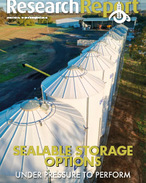This article is 3 years old. Images might not display.
The research involves the University of New England (UNE), Meat & Livestock Australia (MLA), the NSW Department of Primary Industries (NSW DPI) and Angus Australia.
UNE's Professor Julius van der Werf and Associate Professor Sam Clark will lead two projects looking at the genetic improvement of sheep and cattle, and if successful, Australian producers will have access to DNA-based breeding information that will lead to more methane-efficient livestock.
"These projects could result in a 25 per cent reduction in methane emissions from Australian livestock by 2050," said Professor van der Werf.
"While genetic improvement in reducing methane emissions is slow, the results are cumulative and the project expects to reduce methane emissions by one percent per head per year."
Over the next five years, the research projects will measure the methane output of 8000 cattle and 10,000 sheep living in both feedlot and grazing conditions.
Associate Professor Clark will lead the $14.5 million beef component in partnership with the NSW DPI, MLA and Angus Australia, while Professor van der Werf will work with the NSW DPI and MLA on the $4.5 million sheep study.
"We'll examine the variation between the animals, and the data will be used to predict which animals have the genetics that will lower the amount of methane an animal naturally produces," said Professor van der Werf.
"Feed intake will also be measured, as feed efficiency might be aligned to animals that emit relatively less methane. Both teams will work closely with the Animal Genetic and Breeding Unit at UNE to produce methane breeding values for Australian cattle and sheep."
While some of the research will be undertaken in controlled situations on research facilities owned by UNE and the NSW DPI, the projects will also measure methane outputs of commercial sheep and cattle on-farm.
"UNE's Tullimba Feedlot is the largest research feedlot in Australia, so that will provide us with an invaluable opportunity to monitor the methane output of feedlot cattle," said Associate Professor Clark.
"We'll have several students working on these projects, while all of our research will flow into our teaching, helping us to produce graduates at the forefront of innovation in agriculture," Professor van der Werf said.
"Through this exciting research together with the NSW DPI and Angus Australia, UNE is continuing to help the agricultural industry act on climate change and become more sustainable."
The projects fall under MLA's Emission Avoidance Program through its Carbon Neutral Strategy.























